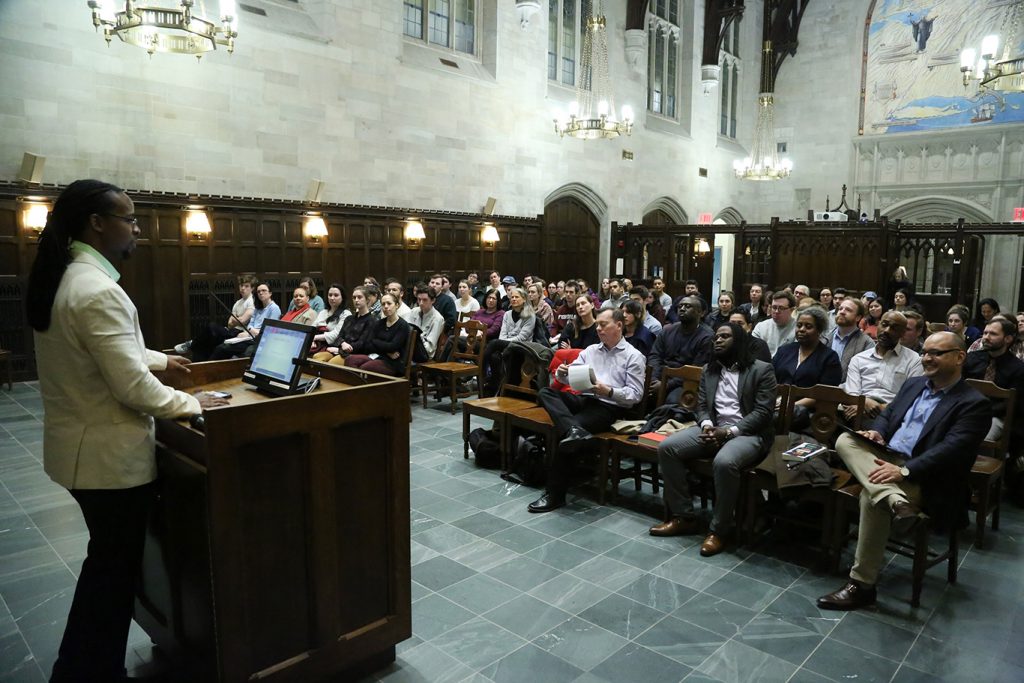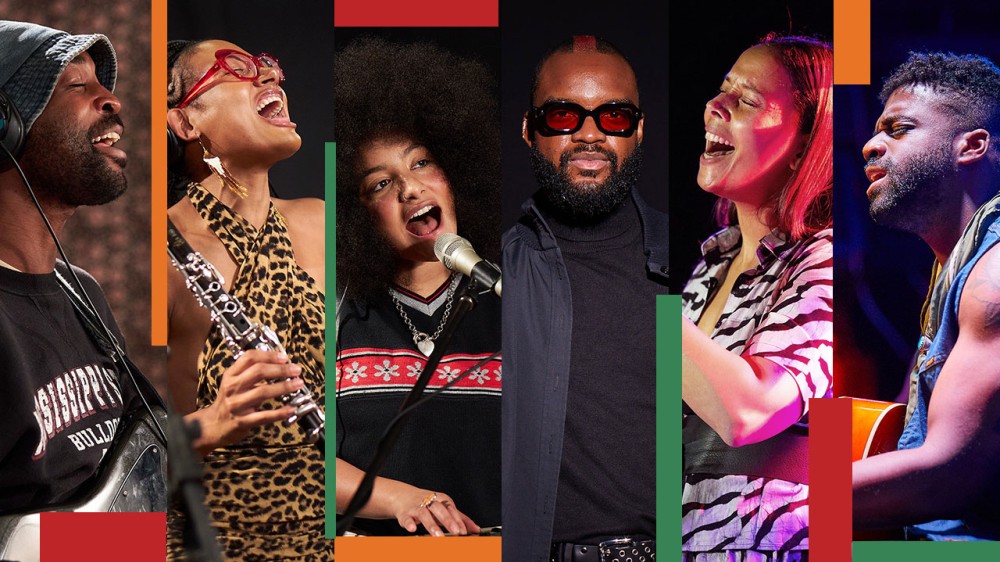*This is a working list. It will be updated as new events are planned.
Love Your Skin: A Tabling Event
Thursday, Feb. 15, 1 p.m.; Lowenstein Plaza, Lincoln Center Campus
Sponsored by the Black Student Alliance at Lincoln Center and the Office of Multicultural Affairs
WFUV Presents: Music of the Civil Rights and Black Consciousness Movements
The names of many Black artists and cultural icons are woven throughout the decades of the Civil Rights and Black Consciousness Movements, including Nina Simone, Max Roach, Gil Scott-Heron, Archie Shepp, James Brown, John Coltrane, Sly Stone, Curtis Mayfield and more, with the inclusion of Civil Rights allies like Bob Dylan. “Music of the Civil Rights and Black Consciousness Movements” examines the critical social revolution taking place in America and the popular music that accompanied it,
Thursday, Feb. 15., 10 p.m. to midnight; Listen at 90.7 FM, streaming online
Casa Noir
Join the Caribbean and African Student Association for a night of elegance and illusion celebrating Black History Month.
Friday, Feb. 16, 7 – 9 p.m.; McShane Great Hall, Rose Hill Campus
Ilyasah Shabazz: Empowering Voices—A Legacy of Inclusion Within the Youth
Shabazz is the daughter of Malcolm X and Betty Shabazz and the author of the memoir Growing Up X (One World, 2003)
Tuesday, Feb. 20, 5:30 p.m.; Fordham Prep Theater, Rose Hill Campus
Sponsored by ASILI, the Black Student Alliance at Rose Hill; the Office of Multicultural Affairs; and the Office of the Chief Diversity Officer
WFUV Presents Ashford & Simpson: The Real Thing
Nicholas Ashford and Valerie Simpson look back on their long career as influential songwriters, producers, and performers. WFUV’s Jeff Foxx hosts with stories behind songs like “Ain’t No Mountain High Enough,” “I’m Every Woman,” “Solid,” and more classics this songwriting duo wrote for themselves and artists like Diana Ross, Ray Charles, Chaka Khan, and Marvin Gaye & Tammi Terrell.
Tuesday, Feb. 20, 9 – 10 p.m. and Thursday, Feb. 22, 10 – 11 p.m.; Listen at 90.7FM, streaming online
Karaoke Night
Thursday, Feb. 22, 5:30 p.m.; Rose Hill Commons, Rose Hill Campus
Sponsored by the Office of Multicultural Affairs
Black History Month Art Showcase
Thursday, Feb. 22; Lowenstein, 12th floor, Lincoln Center Campus
Sponsored by the Black Student Alliance at Lincoln Center and Fashion For Philanthropy. Undergraduates only
The Melanin Expo
Thursday, Feb. 22, 12 – 3 p.m.; Lowenstein Plaza, Lincoln Center Campus
Sponsored by the Office of Multicultural Affairs
The Third Annual Eunice Carter Lecture presents A Moderated Conversation with Michelle Alexander “Beyond The New Jim Crow”
Michelle Alexander has played a pivotal role in breaking the silence about racial injustice in the American criminal legal system. Her bestselling book, The New Jim Crow, helped to spark a wave of discussion, debate and activism nationwide. The book explores the political, legal and social dynamics that have led to the morphing and rebirth of systems of racial and social control in the United States, most recently mass incarceration. Alexander points to the wars on crime and drugs, as well as a legal regime that facilitates discriminatory enforcement of our nation’s criminal laws, as central to the maintenance of racial inequality in this country. She persuasively argues, “We have not ended racial caste in America; we have merely redesigned it.” In the years since the publication of The New Jim Crow, Alexander has published opinion pieces on a wide range of topics related to race and social justice, including mass deportation, reproductive rights, restorative justice, climate change, police violence and more. In this moderated Q&A, the acclaimed civil rights lawyer and scholar explores the myths surrounding our criminal injustice system from a racial and human rights standpoint, and reflects on the racial and social justice crises of our time.
Thursday, Feb. 22; 5:30 – 7:15 p.m.; Costantino Room, Second Floor, Fordham Law School
Museum Outing
Saturday, Feb. 24; Museum of Contemporary African Diasporan Arts
Sponsored by the Office of Multicultural Affairs, more details TBD
Love Your Hair Expo
Saturday, Feb. 24; McShane Center, Rose Hill Campus
Sponsored by the Office of Multicultural Affairs, CurlTalk, the Caribbean and African Student Association and ASILI—the Black Student Alliance at Rose Hill
WFUV Presents: Up Front Soul—Women’s History Month
The strong, inspiring voices of Black women, both musicians and activists, uplift this special and include Nona Hendryx, Aretha Franklin, Mavis Staples, Sister Rosetta Tharpe, Fannie Lou Hamer, Diana Ross, Leontyne Price, and many other iconic figures.
Monday, Feb. 26, 1– 3 p.m., and Thursday, Feb. 29, 1 – 3 p.m.; Listen at 90.7FM, streaming online
Black History Month Reception
A collaborative environment amongst students, alumni, and faculty in which they can mix, mingle, network, and celebrate Black excellence. The reception will include a featured alumni panel with a student moderator and a buffet-style dinner.
Monday, Feb. 26, 6 – 9 p.m.; Lowenstein, 12th Floor Lounge, Lincoln Center Campus
Sponsored by the Black Student Alliance, the Caribbean Students Club, the Career Center, the Department of African and African American Studies, and the Office of Multicultural Affairs
Black Women’s Her-Story Week Tabling and Fundraiser
Wednesday, Feb. 28, 12:30 p.m.; Lowenstein Plaza, Lincoln Center Campus
Sponsored by the Office of Multicultural Affairs
Women of Color in STEM Panel
The Black History Month Women of Color in STEM Panel is dedicated to exploring the journeys, triumphs, and unique challenges faced by women of color in STEM fields. The panel discussion will feature experts who have personal experience navigating obstacles and achieving their goals, which will provide attendees with a comprehensive understanding of the issues that women of color encounter in both academic and industrial environments.
Wednesday, Feb. 28, 12:30 – 1:30 p.m.; McShane Center Room 311, Rose Hill Campus
Sponsored by the Career Center
]]>“I was always really interested in migration and movement—why people move and what happens when they move and how they form community,” said Maddox, an associate professor in the African & African-American Studies department.
In her new book, A Home Away from Home: Mutual Aid, Political Activism, and Caribbean American Identity (University of Pennsylvania Press), Maddox explores those ideas, as well as the influence of organizations that supported Caribbean immigrants as they arrived in the U.S. around the early 1900s.
How did you come up with the idea for A Home Away from Home?
I knew that I wanted to work on some aspect of immigration or migration history for my Ph.D. [which she earned in 2016]. I started going to the Schomburg Center [for Research in Black Culture]in Harlem, and I found these records of Caribbean-American mutual aid societies. There were so many of them. I thought, “They’re really important. We should be talking about this.”
What did you learn from studying these mutual aid societies?
I realized that the societies were important for lots of reasons: helping migrants form community with each other and taking care of them in a time where there weren’t many outlets for Black immigrants.This is when we have a lot of segregationist laws in the U.S. toward Black people … and they’re not OK with that. They become really politically active. They’re fighting against anti-lynching laws. They’re fighting for better living conditions within New York City, better education. This is also the time where we have a lot of xenophobic immigration laws.
What were some of the surprising parts of your research?
[These immigrants] are also still heavily involved in the politics of home—the political climate of the Caribbean, and what’s happening there. Globally, they’re also really invested in what’s happening in Africa. One of the key points that I look at is 1935 when Italy invaded Ethiopia; at this time, Ethiopia is the only country on the African continent that’s not colonized by European power. The whole African diaspora and all Black people around the world are looking at Ethiopia. And so these groups are raising money to send to Ethiopian troops. They’re sending supplies there. Some people are actually going to fight for the Ethiopian army. So not only are they invested in what was happening where they are, but they see themselves connected to Black people throughout the world.
How did you see those connections form through your research?
One of the things that I was really interested in is how Black identity is formed—even with my own family, we’re all Black, but there were differences. So how did they become Caribbean, because they start off as someone from Antigua or Jamaica, but then they become Caribbean in the U.S. At the same time, they’re also becoming Black, and they’re becoming African American. They’re living in the same neighborhoods with African American people, they’re in the same job positions.
What do you hope people take away from reading your book?
There aren’t a lot of books that study this early period of Caribbean immigration. We tend to talk about the period after 1960 when there’s this boom of migrants, but I’m really interested to show that there are Caribbean immigrants who were coming prior to that, who are part of the fabric of New York City history, of U.S. history. I’m excited this book is coming out during Black History Month, because we don’t always talk about Black migrants as part of that history. But they are. For instance—no one ever talks about Malcolm X’s Caribbean heritage and what that meant for him as a Black political leader in the U.S. I’m hoping that this helps people feel seen and represented in ways that they hadn’t been before.
This interview has been edited and condensed for clarity.
]]>“Malcolm X is a well-known figure, but I wanted to know more about his mother and her impact on his life,” said Collins. She recently published the historical fiction novel “Ocean Stirrings” (Peepal Tree Press, 2023), based on the life of Louise Langdon Norton Little, a working mother and activist who raised eight children, including Malcolm X. The book, along with other work by Collins, is currently being taught in Fordham’s African & African American Studies program.
In a Q&A, Lambert—an interdisciplinary scholar who studies literature, history, and the African diaspora—asks Collins about Little’s life and influence and teases a glimpse of what to expect at Collins’s upcoming lecture at the Rose Hill campus.
Lambert: What was Louise’s vision of Black nationalism? What kind of activism was she involved in that Malcolm X might have witnessed and learned from?
Collins: Louise was an activist in the Universal Negro Improvement Association (UNIA) led by Marcus Garvey. She sent in reports from various places where they lived and organized. As she went from place to place with her husband, establishing UNIA groups, she was at the forefront, writing the minutes, organizing people, getting people to come to meetings, talking about Black identities, etc. She was not only doing activist work out there, but also at home, showing her children the work of Grenadian political thinker T.A. Marryshow, for example—helping them realize that Blackness is not stupidity.
Lambert: I can’t help but think about what else she might have done with her life, had she been allowed to continue her education. She really took it upon herself to re-educate her children after they came home from school, helping them to openly question what they learned, teaching her children as Black people and as Black Americans.
Collins: Yes, it was interesting to me how she helped to socialize them. How she told them, “You’re being taught that you are worth less as Negro people. And that is not so.”
Lambert: Most historians agree that Malcolm X is an important figure in Black, American, and Caribbean history. What does the story of Louise Langdon Norton Little add—not only to our understanding of Malcolm, but also to history itself?
Collins: I think she’s important as a woman, mother, and individual, dealing with all of the complexities of a Black woman’s relationships, and the way society responds to her. In a sense, it’s not only her story, but a collective trauma.
Every time someone says her full name, Louise Langdon Norton Little, I think that is a story in itself. Little is the name that her husband had because of the white Littles in Georgia. Norton is the name of the father who raped her mother. Langdon is the name of white colonials in Grenada. So every time her full name is mentioned, I think about all those last names that don’t truly don’t belong to her.
This woman is more than Malcolm X’s mother. We know Malcolm’s story, but there are so many people whose stories we don’t know or acknowledge because they have not come to public attention. Louise Little is one such person.
This interview has been edited and condensed for clarity.
Laurie Lambert joined Fordham’s African and African American Studies department in 2017. She served as the co-founder of the University’s Freedom and Slavery Working Group from 2019 to 2023. She is the author of several published works, including her book “Comrade Sister: Caribbean Feminist Revisions of the Grenada Revolution” (University of Virginia Press 2020). She is the daughter of Grenadians and grew up splitting her time between Toronto and Grenada.
Learn more about the upcoming lecture on Feb. 1, to be held at 6 p.m. in the Great Hall in the McShane Center.
]]>*This is a working list. It will be updated as new events are planned.
Wednesday, February 1
Policing Black Families and Black Bodies: A Conversation with Dorothy Roberts, 4:30 – 6:30 p.m.; Lincoln Center Costantino Room
Sponsored by Fordham Law School’s Black Students Association
Friday, February 3
Trivia Night, 5 p.m.; McShane 311, RH Campus
Sponsored by ASILI
Friday, February 3
Poetry Slam, 6 – 8 p.m.; Lowenstein 12th Floor, LC Campus
Sponsored by the Office of Multicultural Affairs
Monday, February 6
Art Night, 7 – 8 p.m.; OMA Conference Room, McShane 224, RH Campus
Sponsored by the Office of Multicultural Affairs
February 7th & 14th
Racial Solidarity Network, 12:30 p.m. – 3:15 p.m., RH Campus
Location shared upon Registration
Sponsored by the Office of Multicultural Affairs
February 8th & 15th
Racial Solidarity Network, 1:30 p.m. – 4:15 p.m., LC Campus
Location shared upon Registration
Sponsored by the Office of Multicultural Affairs
Thursday, February 9
Black Fashion and Sustainability Tabling, 11 a.m. – 1 p.m.; Indoor Lowenstein Plaza
Sponsored by the Black Student Alliance Lincoln Center
Friday, February 10
Step Show and Lessons, 6 – 8 p.m.; McNally Auditorium, LC Campus
Sponsored by the Office of Multicultural Affairs
Friday, February 10
Movie Night: The Woman King, 6 p.m.; McShane 311
Sponsored by ASILI
Monday, February 13
Movie Night, 5:30 – 7:30 p.m.; McShane 311, RH Campus
Sponsored by the Office of Multicultural Affairs
Tuesday, February 14
Black Love Tabling, 11 a.m. – 1 p.m.; Indoor Lowenstein Plaza
Sponsored by the Black Student Alliance Lincoln Center
Wednesday, February 15
Keynote Speaker: Kevin Richardson, 7 p.m.; Fordham Prep Auditorium
Sponsored by ASILI
Friday, February 17
BHM Mixer, LC Campus
Sponsored by the Black Student Alliance Lincoln Center
Friday, February 17
Celebrity All-Stars, 7 p.m.
Sponsored by ASILI
Tuesday, February 21
Game Night, 5:30 – 7:30 p.m., McShane 234-235, RH Campus
Sponsored by the Office of Multicultural Affairs
Tuesday, February 21
Bingo Night, 6 p.m.
Sponsored by ASILI
Wednesday, February 22
A Fireside Chat with Valerie Irick Rainford, FCRH ’86, 1 – 2:15 p.m., Virtual
Sponsored by the Gabelli School of Business
Wednesday, February 22
Being Black at Fordham, 4:30 p.m.
Sponsored by ASILI
Wednesday, February 22
Women’s Basketball Game – Black History Month Honoring and Celebration, 7 p.m.; Rose Hill Campus
Sponsored by Athletics
Thursday, February 23
The Melanin Expo, 11 a.m. – 1 p.m.; Lowenstein Indoor Plaza, LC Campus
Sponsored by the Office of Multicultural Affairs
Thursday, February 23
Love Your Hair Expo, 1:30 – 3 p.m., Bepler Commons, RH Campus
Sponsored by the Office of Multicultural Affairs
Thursday, February 23
Why Black History Matters, 6 p.m., Lowenstein 12th Floor Lounge, LC Campus
Sponsored by the Department of African and African-American Studies
Thursday, February 23
Black Artists Tabling, 11 a.m. – 1 p.m.; Indoor Lowenstein Plaza
Sponsored by the Black Student Alliance Lincoln Center
Friday, February 24
BHM Art Showcase, LC Campus
Sponsored by the Black Student Alliance Lincoln Center
Monday, February 27
Book Event with Errol Pierre, GABELLI ’05, Track/Field Alumni, and his new book: The Way Up — Climbing the Corporate Mountain as a Professional of Color, moderated by Rafael Zapata 7-8 p.m.; McShane 311
Sponsored by Athletics
Tuesday, February 28
Power: The Rise of Black Women in America, 4 p.m.; LC Campus
Sponsored by the Department of Communication and Media Studies
Tuesday, February 28
Black History Month Reception Dinner, 6 p.m.
Sponsored by ASILI
Tuesday, February 28
Meredith Trial Reenactment & Panel, 4 – 5:30 p.m., Moot Courtroom, Fordham Law School
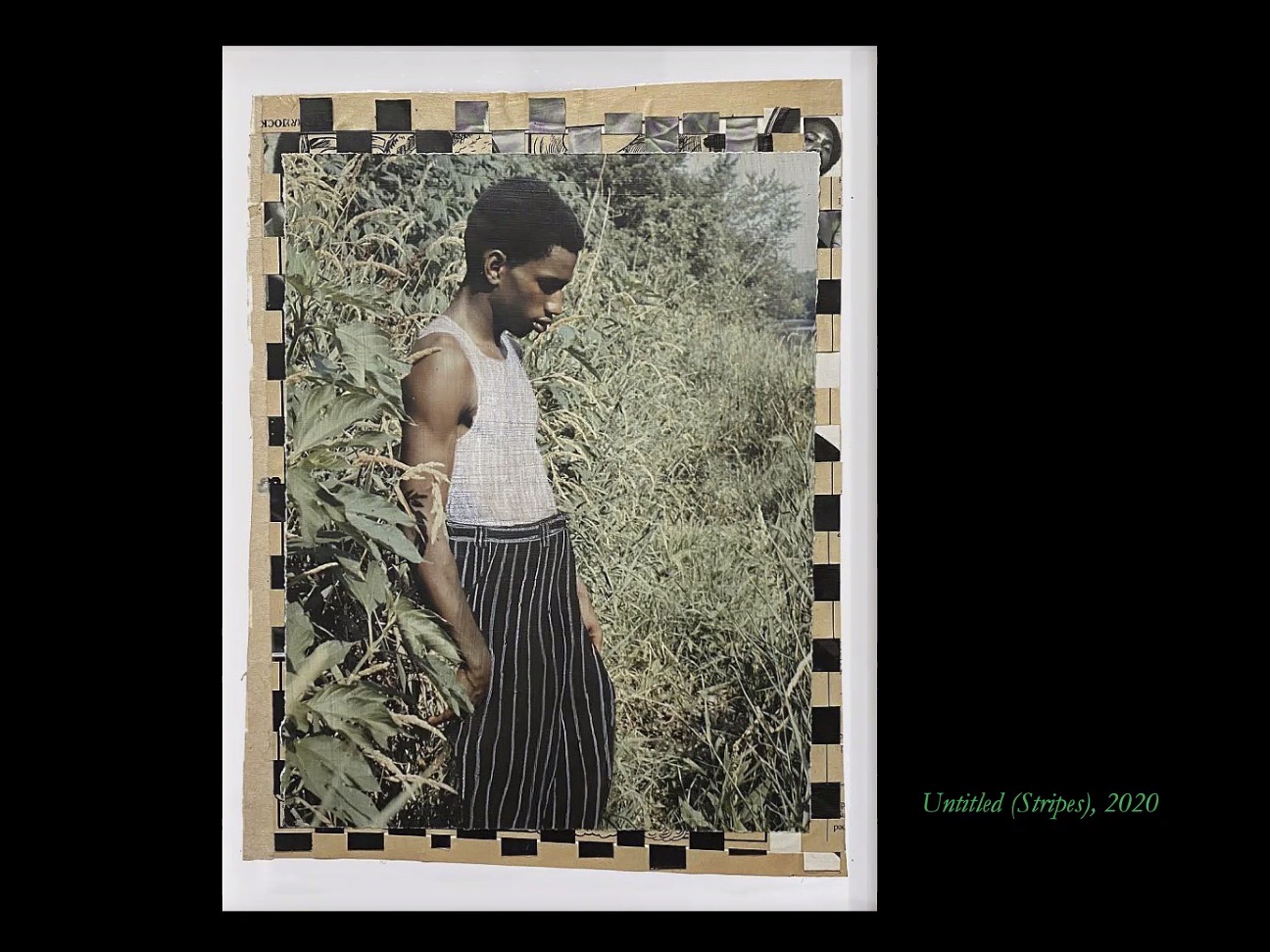
“This talk comes out of having—after a year and a half of lockdown, terror, and isolation—the opportunity to encounter the work of Black artists that I was not familiar with, and to be able to encounter it in ways that made the spaces of their exhibition much clearer and more fraught to me,” Campt said in the Feb. 3 webinar.
Campt is a professor at Brown University and a Black feminist therorist. She has authored five books, including the newly released A Black Gaze: Artists Changing How We See (The MIT Press, 2021), which explores the work of contemporary Black artists. Her webinar explored the work of three Black artists that were not included in her newest book: Maxwell Alexandre, Troy Monches-Michie, and Jennifer Packer. Through different mediums, their artwork collectively probes different parts of the Black identity—including masculinity, queer desire, and vulnerability—and establishes critical dialogue in the largely white art world, said Campt.
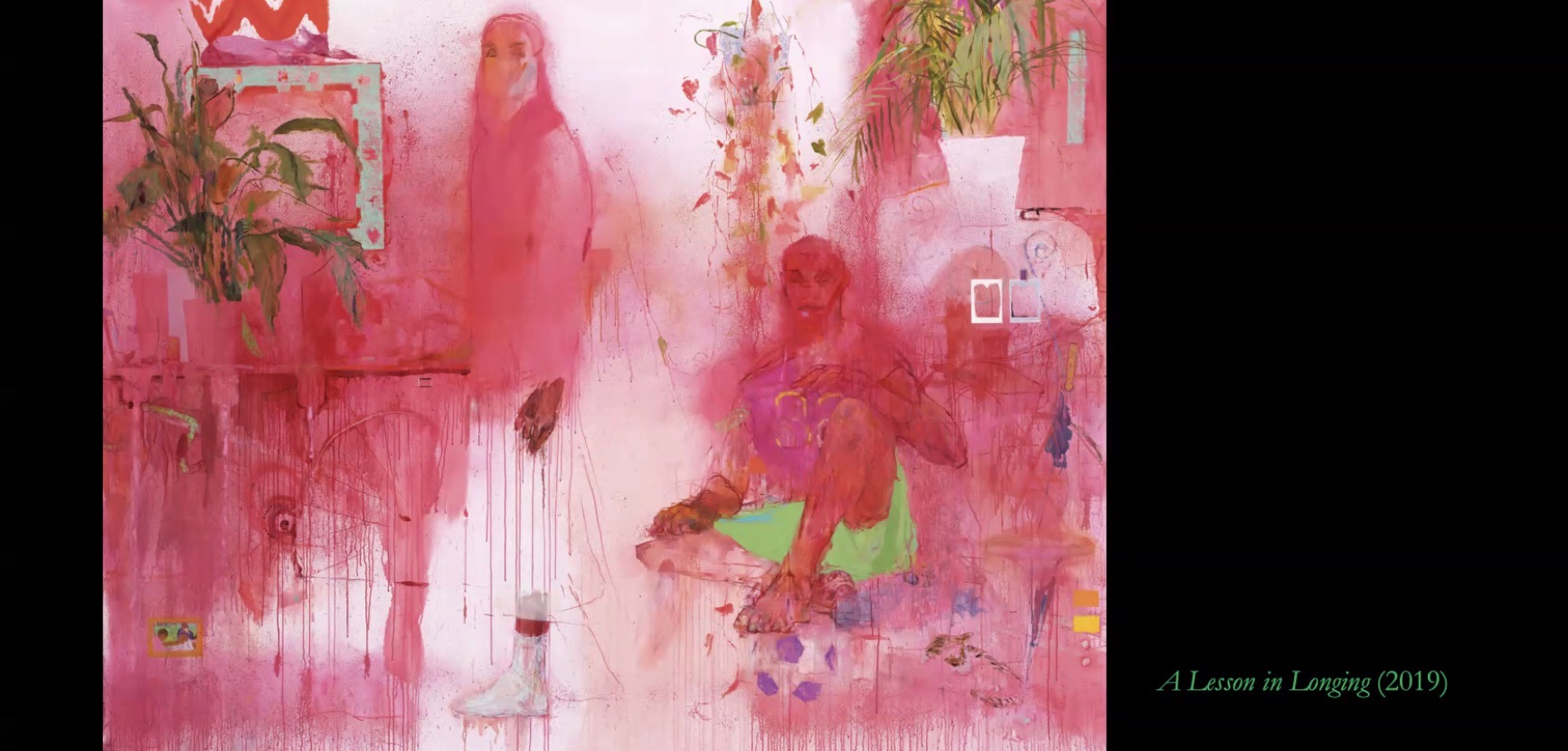
She recalled her recent visit to Maxwell Alexandre’s New Power exhibit at the Palais de Tokyo in Paris, France, which features paintings of Black and brown people in scenes of everyday life. As museum visitors contemplate the illustrated people, the figures in the paintings also observe their real-life onlookers. While viewing the artwork, Campt arrived at an uncomfortable realization.
“In their gallery, all the visitors are Black. In mine, I am the only non-white spectator for the two hours I spend in the space. It’s a contrast I’ve internalized as normal—an expectation of being out of place that usually overtakes me as I approach the counter of a museum. It is equally palpable when I pass the threshold of a gallery and am met with stares or a complete lack of acknowledgement from blasé gallery staff who fail to look up from their counters,” Campt said. “New Power upends the dynamics of being out of place by recentering those often neglected and relegated to this position.”
Alexandre’s art revealed something else to Campt. As she walked around the gallery, she saw Black security guards—both the illustrated and real-life versions. When a lively group of young people arrived at the gallery, she noticed a Black security guard who closely monitored them.
“Watching the guard as he shadowed them while moving through the gallery, I was struck by the fact that the art gallery is one of the few places where Black folks, often armed, are permitted to actively surveil white audiences,” Campt said. “What do the guards think of encountering their painted simulacra in spaces where they are usually overlooked or made invisible? … Sadly, both my French and my nerves failed to let me pose these questions. But it’s nevertheless one of the central questions posed by Alexander and articulated unequivocally in New Power … How might we lay claim to these spaces in ways that refuse not only a white gaze of consumption or exploitation, but instead initiate moans of reclamation and redress?”
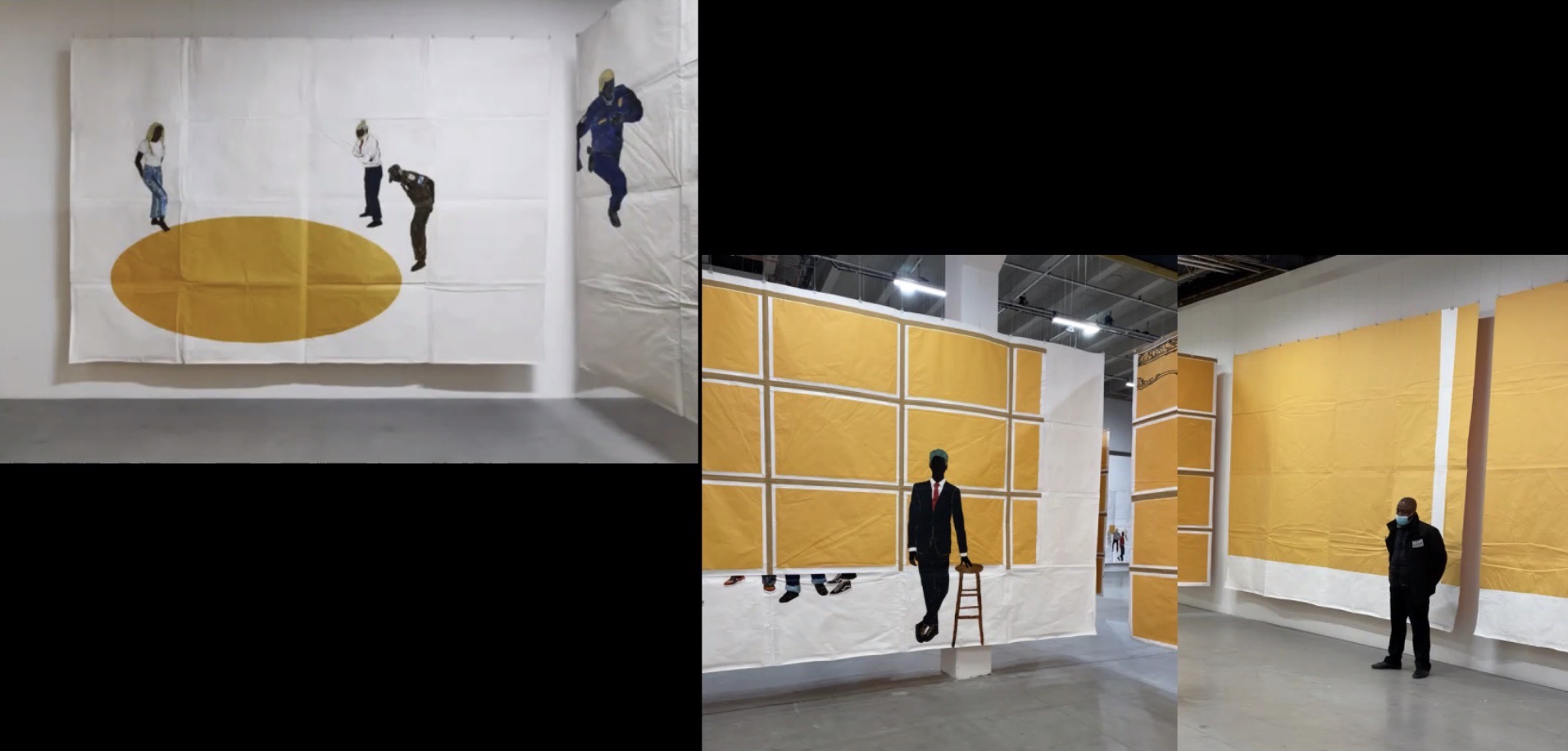
In a Q&A with the audience, Campt explained her creative process every time she encounters new art. In addition to considering the artwork, she observes the actual space surrounding the piece, the sounds of the gallery, and the people within the room, and then records her observations on an iPad.
What’s most important is not what we literally see in the moment, but how we respond to the artwork, she said.
“When I say that I’m writing to images, I’m writing from that response that they are soliciting from me. And in doing that, I’m trying to create a dialogue,” she said.
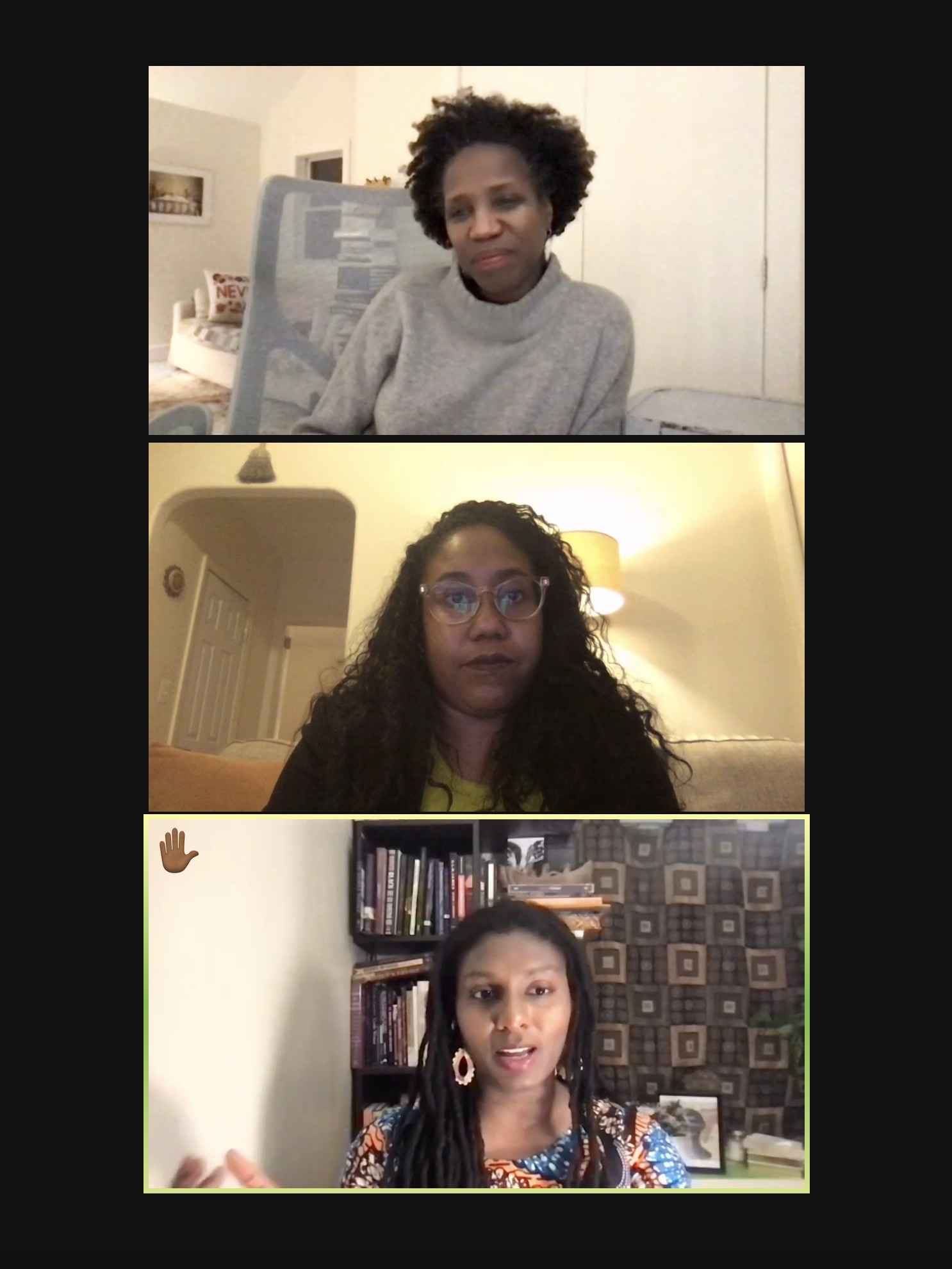
At the end of the webinar, moderator Brandy Monk-Payton, Ph.D., assistant professor of communication and media studies, said she observed in Campt’s work “this kind of insistence on the local, the intimate, and the interior as a way to sort of remain vigilant in some respects.”
“I’m wondering how we can sort of remain vigilant in supporting understanding of a Black gaze in this moment, this proliferation of wonderful media makers, creatives,” Monk-Payton said.
Campt said that the key to vigilance is discomfort.
“What I’m talking about in terms of a ‘Black gaze’ is art that makes us feel uncomfortable. Artwork that makes us work. Not artwork that’s good, per se, but artwork that’s good because it’s hard,” Campt said. “How easy is this? How comfortable do I feel with that? And what does it mean to question that comfort?”
This event was co-sponsored by the Arts and Sciences Council, the Division of Mission Integration and Ministry, and the Office of the Chief Diversity Officer.
]]>*This is a working list. It will be updated as new events are planned.
Week 1: Jazz & Hip-Hop
Sponsored by WFUV
As part of WFUV’s month-long celebration of pioneering Black musicians, they’ve asked emerging young artists in an array of genres, including Ghanaian-Australian singer and rapper Genesis Owusu and fast-rising country star Brittney Spencer, to write about the “Five Essential Albums” that have inspired their own journeys. You can find these features at wfuv.org throughout the month of February.
Tuesday, February 1, 2022
- Speaking Truth to Power: A Conversation with Nikole Hannah-Jones, 6 – 7:15 p.m., Lincoln Center Costantino Room
- The Inaugural Eunice Carter Lecture as part of the Speech Acts Series.
Wednesday, February 2, 2022
- Guest Speaker Moses Harper, 7 p.m., Zoom
Thursday, February 3, 2022
- Black History Month Lecture with Tina Campt, 6 p.m., Zoom
- Fordham’s Department of African and African American Studies is pleased to invite you to our Annual Black History Month Lecture. This year’s speaker is Professor Tina Campt (Brown University), presenting her new book A Black Gaze: Artists Changing How We See.
- Kahoot Trivia night, Rose Hill
Week 2: Blues, Rock, & Country
Sponsored by WFUV
Monday, February 7, 2022
- Movie Night, Rose Hill
Wednesday, February 9, 2022
- Black Culture Celebration, 6 – 8 p.m., Lincoln Center
- McMahon 109
Thursday, February 10, 2022
- The History of Black Beauty – A View from Brazil, 12 – 1 p.m., Zoom
- Historian and prominent black feminist Giovana Xavier (Federal University of Rio de Janeiro, Brazil) talks with Yuko Miki about the history of Black beauty. This event will be in English and have an audience Q&A.
Week 3: Funk, Soul, and R&B (Reggae)
Sponsored by WFUV
This week, WFUV News will be exploring New York City parks named in honor of legendary Black music artists, from Betty Carter to Gil Scott-Heron. Listen to these reports in the 7:54 a.m. and 4:54 p.m. newscasts.
Monday, February 14, 2022
- Valentines Day Event, Rose Hill
Tuesday, February 15, 2022
- Racial Solidarity Network, 12:30 – 3:15 p.m., Zoom
- Movie Night, Black Panther, 6 p.m., Lincoln Center Student Lounge
Wednesday, February 16, 2022
- Racial Solidarity Network, 1:15 – 4:15 p.m., Lincoln Center
Friday, February 18, 2022
- Black History Month Trivia, 3 – 5 p.m., Lincoln Center
- McNally Hall
Week 4: Pop
Sponsored by WFUV
Tuesday, February 22, 2022
- Racial Solidarity Network, 12:30 – 3:15 p.m., Zoom
Wednesday, February 23, 2022
- Racial Solidarity Network, 1:15 – 4:15 p.m., Lincoln Center
Thursday, February 24, 2022
- Love Your Hair Panel, 11 a.m., Zoom
- Love Your Hair Expo, 12 – 2 p.m., Lincoln Center Indoor Plaza
Monday, February 28, 2022
- Diaspora Event, Rose Hill
Dear Members of the Extended Fordham Family,
As you know, today is Martin Luther King Jr. Day, a day that usually stands at the head of the University’s Spring Semester calendar, and a day on which we usually gather on campus to remember and to thank God for Dr. King’s remarkable life and equally remarkable ministry devoted to the cause of civil rights and racial equality. It is especially sad that this year, of all years, the restrictions placed on us by the pandemic make it impossible for us to be together to remember him, to reflect on his life and on the prophetic role that he played (and continues to play from his place in heaven) in the life of our country.
Our inability to be with one another on this important (feast) day, however, doesn’t mean that we can’t remember, celebrate, and be bothered (in the most saving way imaginable) by his life and message. In fact, I think that letting the day pass by this year without notice and without deep and reflective prayer on the meaning of his life would be nothing less than sinful. Therefore, I invite you to join with me in reflecting on his life and ministry. As I do so, I wonder if I could share with you a story about Dr. King that has enriched my understanding of him. Many years ago (more than forty years ago, in fact), when I was a graduate student at the University of Chicago, I had the good fortune to be mentored by Martin E. Marty, a scholar who was considered to be the dean of historians of American religious history and a professor who rubbed shoulders on a regular basis with those who were making history—not just writing about it. In the course of one of the courses he taught me, he told his students a story about an experience he had with and of Dr. King that is still fresh in my memory.
After Dr. King had been the headliner at a conference that he had organized, Mr. Marty and his wife, Elsa Marty, invited Dr. King and his wife, Coretta Scott King, to dinner to celebrate the success of the program. When they arrived at the restaurant, the four of them were shown to a banquette at the back of the restaurant. Mr. and Mrs. Marty scooted into the inner seats against the wall and began to settle in. Dr. and Mrs. King just stood there. After a few awkward moments, Dr. King simply said that he and his wife would prefer the seats against the wall. Mr. and Mrs. Marty slid out of their seats immediately and Dr. and Mrs. King took their places. After they had all settled in, Mr. Marty asked Dr. King why he wanted the seat against the wall (since Mr. Marty had thought that he would prefer a seat that would be less confining). Dr. King sighed and said, “I believe that I will be assassinated. I just want to be able to look the man who is carrying it out in the eyes as he pulls the trigger.”
As you might imagine, we all gasped when Mr. Marty shared this story with us. Because for the first time in our lives, we began to understand just how costly Dr. King’s prophetic ministry was, and how reconciled he was to embracing the cross that he had taken up in assuming that ministry. After hearing that story, I saw him as a prophet who knew full well the cost and burden of the role he played—not for himself but for his community and for the whole nation. A prophet. Not a role one would choose for oneself. Not a cross that is light. Not a cross that is easy to bear. But it was clear that Dr. King accepted the role with grace, with strong and serene conviction, and with deep love.
His biography makes it clear that it was a heavy and costly ministry that he took on. He was considered a troublemaker in his time. He was jailed by local police for leading nonviolent protests (most notably in Birmingham, Alabama). He was relentlessly investigated by the FBI. Ultimately, as he suspected, he was assassinated by a racist white man who could not abide the prophetic message that he delivered to a nation that was all too frequently unwilling to accept it. In spite of the treatment that he endured in his lifetime, however, Dr. King’s reputation and importance in American life has only grown in the last fifty-three years, thanks to the hard work of scholars, civil rights advocates, and journalists. Likewise, the centrality of Black people in American history is now rightfully acknowledged, thanks to the research done by generations of historians, sociologists, and writers.
Their work is not over, of course, nor is Black people’s struggle for full equality in our country. Now, I cannot presume to know what Dr. King would think of the state of race relations in America in the years since his ministry was cut short by a bullet. I am not wise enough to have an answer to the intractable problem of our national divide on race. But I know enough to know that I don’t want to be part of the problem. Nor do I want our beloved Fordham to be a part of the problem. I would much prefer to have Fordham be on fire (as Saint Ignatius would want it to be) and to set the world on fire for the cause of the Gospel, which is, as Dr. King knew with every fiber of his being, the cause of justice, and the cause of inclusive and redeeming love.
As a Jesuit, Catholic community of higher education, Fordham’s mission demands that we lean into such matters, however uncomfortable. Doing so is what our students expect of us, and less loftily but nonetheless true, ensuring racial equity is what a modern university must achieve to distinguish itself in a crowded and uncertain higher education landscape.
The University has a number of events scheduled for Black History Month, a list of which you can find on this page on the Fordham News site. The list will be updated with new events as they are confirmed (see the list for contact information if you would like to add or update an event).
Finally, know that you are all in my prayers, today and every day. I hope and pray that this month will mark the beginning of the healing process the country desperately needs, and a new attentiveness to the well-being of all Americans, regardless of race, religion, ethnicity, or political affiliation.
May God bless the United States. May God bless Fordham.
Sincerely,
Joseph M. McShane, S.J.
Monday, January 18 – Friday, January 22
MLK Week 2021: Social Media
Timeline of Martin Luther King’s life on Instagram @FordhamOMA and @BlackHistoryatFordham
Monday, January 18, 3 p.m.
Virtual Storytime and Concert for Kids
The event will feature a story fitting for MLK Day, read by Miz Jade, featured in NYPL’s Drag Queen Story Hour, followed by performances from three acclaimed children’s musicians: Grammy Award winner Lucy Kalantari, Grammy nominee Joanie Leeds, and music and social justice artist Fyütch.
Streaming live on the WFUV News YouTube channel. Sponsored by WFUV and New York Public Library
First two weeks of February, twice daily, 7:12 a.m. and 4:12 p.m.
Black History Minutes
Featuring historical episodes of the African American experience in NYC
Sponsored by WFUV
Wednesday, February 3, 12 p.m.
Gabelli Faculty-Lead Workshops
Marketing and Racial Implications with Dr. Peter Johnson (pending) and/or Dr. Ahir Gopaldas (confirmed)
Sponsored by the Gabelli School of Business
Friday, February 5, 8 p.m.
Celebrating Black Voices: Self-Made Film Discussion Group
As we celebrate Black History Month over the month of February, we will be discussing the docuseries, Self-Made. Watch four short episodes of the docuseries on Netflix prior to the discussion. This event will be hosted by Lecia Ductan, PMBA student and Ilze Frierson, Assistant Dean.
Sponsored by the Gabelli School of Business
Week of February 8
PRX’s Black Radio: Telling It Like It Was, 25th-anniversary special
The program covers the story of radio’s role in the 20th-century transformation of the African American community. First aired in 1996, the specials have been reformatted into six hours for 2021. Original host Lou Rawls guides us, with new narration from original producer Jacquie Gales Webb.
Sponsored by WFUV
Monday, February 8, 6:30 – 8 p.m.
GSS Black Student Caucus Meeting
Topic: Show, Sip + Tell (Part poetry slam, part book club, part art class; Bring your favorite beverage and experience everyone’s talents)
Sponsored by the Graduate School of Social Service
Monday, February 8, 6:30 – 7:30 p.m.
GSS Students Challenging Anti-Black Racism Caucus Meeting
Sponsored by the Graduate School of Social Service
Wednesday, February 10, 5 p.m.
Student Spotlight Series—Opposing Apartheid
R. Bentley Anderson, S.J. will be moderating a conversation with Jade Crichlow and Eric Purisic, students in his Fall 2020 History of South Africa course. This will be a 45 minute conversation based on the students’ final papers for the class.
Sponsored by the Department of African & African American Studies
Wednesday, February 10, 6:45 – 8:15 p.m.
GSS Black Alumni Caucus Meeting
Topic: The Influence of Social Media on Our Community
Topic Co-Facilitators: Shantel Robinson and Rupert Pearson
Sponsored by the Graduate School of Social Service
Wednesday, February 10, 6 – 7 p.m.
Celebrating Black Voices: Alumni Panel
As part of Black History Month, this alumni panel will focus on what it is like to be Black in the workplace. Hear from a panel of Black alumni who will discuss how their identity affects the work they do, how they show up, and more.
Sponsored by the Gabelli School of Business
Second two weeks of February, twice daily, 7:12 a.m. and 4:12 p.m.
Vignettes highlighting Black-owned businesses in the New York metropolitan region
Sponsored by WFUV
Tuesday, February 16
Kanaval
A three-part music and audio documentary hosted by Leyla McCalla of Carolina Chocolate Drops and Our Native Daughters. Kanaval covers the relationship between Mardi Gras and Kanaval, the importance of music in Haitian life, and the ways musicians and organizers in Haiti and New Orleans have navigated this year.
Sponsored by WFUV
Wednesday, February 17, 5 – 7 p.m.
Black Student Panel Discussion | Gabelli School
Video: Farrakhan on Donahue (1990)
Panelists: Diontay Santiago, Lecia Ductan, Azali Ward, and 2 additional ASILI students (pending)
Moderator: Clarence E. Ball III
Sponsored by the Gabelli School of Business
Wednesday, February 17, 12 p.m.
Celebrating Black Voices: Year of Yes Book Discussion Group
As we celebrate Black History Month over the month of February, we will be reading Year of Yes by Shonda Rhimes. In this poignant, hilarious, and deeply intimate call to arms, Hollywood’s most powerful woman, the mega-talented creator of Grey’s Anatomy and Scandal and executive producer of How to Get Away with Murder reveals how saying YES changed her life—and how it can change yours too. Join us for a small group discussion of Year of Yes.
Sponsored by the Gabelli School of Business
Thursday, February 18, 6 p.m.
Webinar: Black Lives Matter and the American Political Landscape
Sponsored by the Department of African & African American Studies
Friday, February 19, 8 p.m.
Gabelli Faculty-Lead Workshops
Big Data and Social/Racial Justice with Dr. Chaitra Nagaraja (pending)
Sponsored by the Gabelli School of Business
Wednesday, February 22, 11:30 a.m. – 12:30 p.m.
Black Feminist Worldmaking Series with Bettina Judd of University of Washington
Do Not Despair, Turn to Fire: Lorde and Morrison on Feeling and the Work
Sponsored by the Department of Department of English, and the Women’s, Gender, and Sexuality Program
Contact: Sasha Panaram at [email protected]
Monday, February 22, 6:30 – 8 p.m.
GSS Black Student Caucus Meeting
Facilitator: Khalilah Daniels
Topic: The Isis Papers
Sponsored by the Graduate School of Social Service
Tuesday, February 23, or Wednesday, February 24
Racial Solidarity Network Spring 2021 training/workshop
Open to members of the Fordham community.
Option for hybrid or virtual attendance at registration
Wednesday, February 24, 3 – 5 p.m.
Fireside Chat and Interview | Gabelli School
Moderator: Dean Donna Rapaccioli, Dean of the Gabelli School of Business
Featuring: Mandell Crawley, Global Head of Human Resources for Morgan Stanley
Sponsored by the Gabelli School of Business
Friday, February 26, 8 p.m.
Black History Month Student Work Virtual Showcase | Gabelli School
The event will showcase the top submissions from Gabelli School students focused on action around Black History Month. Examples of student action include volunteering with a Black mission-driven organization and writing a reflection on your experience, a written reflection on BHM educational experiences; a personal action plan for incorporating social justice/anti-racist work into current or future career space, a spoken word BHM video, an original music BHM video, and original BHM creative writing/poetry.
Sponsored by the Gabelli School of Business
February, ongoing
MAP Reading Group: Afropessimism by Frank B. Wilderson III
The Fordham chapter of Minorities and Philosophy (MAP) is running a Reading Group throughout the year. In February they will be reading Afropessimism by Frank B. Wilderson III.
Sponsored by MAP and the Department of Philosophy
Contact: Ginger Guin, [email protected]
Wednesday, March 3, 5:30 – 6:30 p.m.
Panel Webinar: Why is Nonprofit Leadership so White?
Sponsored by the Graduate School of Social Service
Monday, March 8
Black Feminist Worldmaking Series with Salamishah Tillet of Rutgers University
Sponsored by the Department of Department of English, and the Women’s, Gender, and Sexuality Program
Contact: Sasha Panaram at [email protected]
Date TBD
Book Launch: White Freedom: The Racial History of an Idea by Tyler Stovall
A celebration of the launch of Dean Stovall’s new book
Sponsored by the Office of the Chief Diversity Officer
Dates TBD
Black History Month Events Hosted by OMA
Watch this space for info on a Book Club, Firsts on the First (highlighting historic Black “firsts”), Black Networking Zoom with Fordham Alumni, Natural Hair Show, Paint Night/Day, “Colorism in the Caribbean,” and more. Includes in-person, hybrid, and virtual programs.
Sponsored by the Office of Multicultural Affairs and the undergraduate student Black History Committee
Date TBD
You Should Know Their Names
A re-airing of the new WFUV News documentary telling the stories of seven Black New Yorkers whose names have been underrepresented in history
Sponsored by WFUV (also available now on WFUV.org)
Ongoing
Applications for 2021-2022 Undergraduate Cultural Programming Committee Leaders
Applicants for the Black History Committee will shadow this year’s committee. The other 5 committees also are accepting applicants for Cultural Programming Coordinators and Program Liaisons.
Follow @FordhamOMA and @BlackHistoryatFordham on Instagram for up-to-date information as February gets closer.
If you’d like to add a new event to this list, please email Diana Chan at [email protected].
]]>Those were the opening words of this year’s annual Black History Month lecture delivered by Saidiya Hartman, Ph.D., professor of English and comparative literature at Columbia University, at the Lincoln Center campus on Feb. 21.
Jim and Julia
Hartman was reflecting on a short science fiction story by W.E.B. Du Bois and its implications on white supremacy as she began her talk, titled “Wild Thoughts and Rumors about the Auspicious Era of Extensive Freedom, or A Speculative History of the Demise of White Supremacy.”
The words described Jim Davis, a black bank messenger, in Du Bois’ short story, The Comet. In Jim’s world, society is still segregated by race. After a comet hits New York and expels toxic gases that seem to have killed everyone around him, Jim finds a wealthy white woman named Julia. Thinking that they are the only humans left in the world, they start to connect and see past the color of each other’s skin. But at the end of the story, they discover there are more survivors. Julia’s father and fiancé find her, and she leaves Jim to join them, while an unnamed black woman holding a baby’s corpse falls into Jim’s embrace.
To Hartman, a 2019 recipient of the MacArthur “genius” grant, The Comet is Du Bois’ attempt to explore the possibility of overturning white supremacy in a post-apocalyptic world. It’s a “tale about interracial love—less what happened to it than a question or doubt about the circumstances in which it might be possible or permitted,” she said.
“One of the things you see in Du Bois is always attempting to imagine what’s going to allow an opening for a new arrangement to emerge or for abolition and democracy to in fact be realized,” Hartman said in Lowenstein’s 12th-floor lounge to an audience of roughly 100 guests, the majority of them students.
Du Bois, a leading scholar and civil rights activist in the first half of the 20th century, wrote The Comet—an example of speculative fiction focused on black society—“in the hope that I may strike here and there a half-tone, newer even if slighter, up from the heart of my problem and the problems of my people,” he wrote in the story’s postscript. The story, part of Du Bois’ book Darkwater: Voices from Within the Veil, is an old tale published in 1920, but its themes still resonate in modern media, Hartman said
“For those of you tempted to dismiss Du Bois and the comet as antiquated, as a variant of Guess Who’s Coming to Dinner, staged against the backdrop of climate catastrophe, I would encourage you to keep in mind contemporary films like Get Out or Bird Box, which also speculate about post-racial futures and end-of-the-world scenarios at the site of interracial love and intimacy,” Hartman said. “The coupling of black men and white women raises the question and possibility of a new race of people, in terms that might redress racial subjection and sexual violence, rather than reproduce it.”
‘The Crime That Du Bois Swears Can Never Be Pardoned’
At the end of the story, white supremacy continues to reign. In this world, “the white world, the world of man,” it is the black woman who has suffered the most, said Hartman.
“The history of insult and degradation, Du Bois notes, weighs most heavily on her shoulders. Her maternity is negated and exploited as a vehicle for the production of capital,” Hartman said. “She lives or dies at the white man’s whim and pleasure, a sentient tool and a property for enjoyment in every way imaginable. The harm the world has done to her has been so great and its violence so unrelenting, so seemingly irreparable, that it is the crime that Du Bois swears can never be pardoned.”
She recalled the mysterious black woman carrying a dead infant at the end of The Comet.
“The damage done to the black’s reputation as human is most severe in her case. Given this, it is not surprising that she is unable to secure a place in the world for her children, or make this unlivable state habitable for the ones she loves, or create minimal conditions for survival, or ensure her future or anyone else’s,” Hartman said.
Midway through the lecture, she looked up from her notes and scanned the audience.
“I know this is all very heavy,” Hartman said. “But it is timely.”
A Lesson on White Supremacy
In the final moments of her lecture, Hartman reflected on white supremacy in the past and present, in a commentary that intertwined Du Bois’ thoughts with her own.
White workers and ex-slaves shared a common enemy: plantation owners and northern industrial capital, Hartman said. But that commonality failed to lead to interracial solidarity or retaliation. The white working class cared more about “the processes of racial enchantment and the possessive investment in whiteness.” They identified more with their white masters and rulers, she said, although they were separated by socioeconomic status.
“This irrational and deep psychic investment in whiteness prevented—and we might add, continues to prevent—any recognition of a shared state or partial commonness with black people,” Hartman said.
The lecture was sponsored by the Department of African & African American Studies, the Office of the Chief Diversity Officer; the Center on Race, Law and Justice; Department of Communication and Media Studies; Department of English; Comparative Literature Program; and Women, Gender, and Sexuality Studies Program. The event was also part of the Women of Color Initiative at Fordham launched in 2018, which encourages women of color to engage in conversation with one another.
]]>“To this day, there are numerous incidents of children and adults being discriminated against or punished because of their natural hairstyle. We’re hoping that this event empowers individuals to embrace their natural beauty and their hair,” said Olga Baez, MC ’05, GSE ’16, executive secretary in Fordham College at Lincoln Center’s residential life office, who is co-sponsoring the event with her nonprofit StriveHigher and the Office of Multicultural Affairs.
The free event will take place on Saturday, Feb. 29, from 11 a.m. to 3:30 p.m. in Bepler Commons, located in Faber Hall. It will feature food, raffles, two authors of color who will read aloud from their children’s books, several speakers who will discuss their hair and style tips, and 10 local businesses from the Bronx and Harlem that will be selling natural hair and skin products on site.
Among the books in the story time session are Don’t Touch My Hair! by Sharee Miller (Little, Brown Books, 2018) and The Girl With The Magical Curls (CreateSpace Independent Publishing Platform, 2018), a paperback by Evita Giron, a freelance writer whose book was inspired by her daughter. She is currently a pastoral mental health counseling student in Fordham’s Graduate School of Religion and Religious Education.
The expo speakers will reflect on their relationship with their hair and give the audience advice on how to care for their own. They include Martha Depumarejo and Kristopher Little, residence directors at Fordham College at Lincoln Center; Franchesca Ho Sang, GSE ’09, an English language arts teacher in the Bronx; and Courtney Gainous, a senior at Fordham College at Lincoln Center.
Gainous’ talk, “Let’s Get Into This: Hair School 101,” will focus on how to take care of your hair as a college student on a budget. It will include quick and easy ways to style your hair and what to do when you’re having a bad hair day, she said. But overall, the goal of her talk is to empower young women.
“I want [young girls]to know that protective styles and natural hair in general are professional and beautiful. Some girls might feel like they have to wear the straight wig or the straight, long weave in order to fit society’s standards. But the box braids and big curly hair—those are all beautiful, too,” Gainous said. “I’ve been wearing those all of my time here at Fordham, and I felt great every moment wearing them.”
Another student speaker, Christine Ibrahim Puri, FCRH ’21, the co-founder and co-president of the Caribbean and African Student Association, will be talking about how she grew to love her natural hair. When she was a young girl in a Nigerian boarding school, she said, she and her classmates were forced to shave off most of their hair. They were told their hair was too difficult to manage and distracting to boys. Some of her classmates cried, she remembered. And she added that everyone should be in charge of their own hair.
“[People should] make it completely up to themselves, and not what other people have to say. Not what is on TV, especially, or magazines,” Puri said. “Whether that is keeping your hair the way it is or blowing it out—whatever it is, it should completely be up to you and not up to society or people around you.”
The Love Your Hair Expo is free and open to the public.
]]>That was the challenge that Ibram Kendi, Ph.D., laid out for an audience at Fordham’s Rose Hill campus on Thursday, Feb. 21.
“The heartbeat of racism is denial,” said Kendi, a professor of history and director of the Antiracist Research & Policy Center at American University.
“One of the reasons why we are constantly concerned about [people’s] intention is because Americans are constantly trying to find ways to deny racism.”
A Valuable Lesson From The Past
Kendi, the author of the forthcoming book, How to Be an Antiracist (One World, 2019) noted at the outset of his talk, “Building Antiracist Institutions,” the appropriateness of delivering it 54 years to the day after Malcolm X was assassinated in Harlem. What Kendi said he admired most in the civil rights icon was his ability to constantly reflect on his own ideas.
“When we’re thinking about being an anti-racist, one of the most essential aspects is having the capacity to look in the mirror and see ourselves for ourselves, be willing to identify what we see, have the courage to say we don’t like what we see, and have the ability to begin to change,” he said.
When we look within ourselves, he said, we need to ask ourselves a question that we’re not used to asking. Instead of asking, are we acting with racist intent when we interact with someone different from us, we need to ask, do our actions perpetuate or result in policies that are racist?
The way to tell the difference is simple, he said. If an idea suggests that any racial group is superior to another, it is racist. And racism, Kendi added, can be found even within seemingly similar groups of people. Wealthy African Americans, for instance, can be every bit as racist toward poor African Americans if they support laws they disproportionally punish them more harshly than say, poor whites.
I’m Not Racist
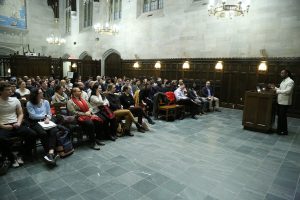
In fact, the history of people promoting racist policies while denying racist intent goes back as far as recorded history.
“When slaveholders were saying things like, black people were the cursed descendants of Ham, and people were challenging them, they’d say, ‘That’s God’s law. I’m not racist.’ They didn’t use the term racist, but they used other terms of that time,” he said.
Jim Crow laws were upheld because they were believed to have validated the “natural order” of African Americans being inferior, Kendi said. And more recently, he added, African Americans were incarcerated in large numbers under the pretext that they were “super-predators” whose communities are inherently dangerous; defenders have pointed to crime statistics to assert that they’re not racist.
“The fundamental objective of racist ideas and those who produce them is to make you and I think that the racial problem is not the policies,” he said, but rather that “the cause of the problems of our society are other people.”
“So, we spend our time fighting with other people who don’t look like us, and sometimes even do look like us, thinking that they’re the problem, as opposed to challenging those racists policies.”
Room For Growth
Ignoring intent and focusing on effects also allows for more nuance when dealing with people, he said. It acknowledges that everyone is trained from birth to rank differences between themselves, and that the goal is to acknowledge differences and simply accept them. And far from being static, people can veer from being racist to being antiracist, depending on the situation.
“Humans are deeply complex. Their minds are deeply complex. When it comes to criminal justice, they’re racist, when it comes to education, they’re anti-racists. When it comes to the environment, they’re anti-racist, when it comes to health care, they’re racist,” he said.
“A racist or antiracist is a reflection of what you are doing or saying in the moment. What we say and what we do is a reflection of who we are,” he added.
“It also allows us to see that each and every one of us has the capacity to change, to be an anti-racist.”
An Uncomfortable Truth
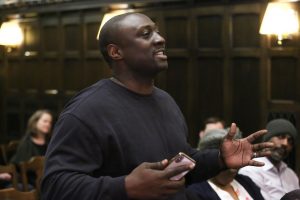
In a lively Q&A session, Kendi, whose appearance at Tognino Hall was sponsored by Fordham’s Office of the Chief Diversity Officer, tackled an array of topics ranging from black-on-black racism, affirmative action, and why a movement like Black Lives Matters could flourish at the same time that the nation had a black president.
Severin Cornelius, a community member from Mount Vernon who sat in the second row, asked if a truly devoted antiracist could also be pro-capitalism. The answer, Kendi said, was no. That’s because even though many socialists insist that class should always take precedence over race, ultimately, capitalism and racism emerged together, evolved together, and are forever intertwined, he said.
Black elites, he said, confront the economic differences within their “racialized class” and assume that blacks who are poor simply don’t work hard enough and don’t have enough education.
“If we were to eliminate the disparities between the races, you will still have disparities between the racialized classes. There would still be disparities between black poor people and black elites,” he said.
“What is the source of the growing amount of wealth that’s being concentrated in a few black hands, irrespective of the growing amount of black poverty? The source of that is capitalism. And the source of that is, many of those black people appreciate capitalism precisely because of how they’re benefiting, even though it’s having disproportionality horrible effect on other people of color.”
